In our previous report from the Commonwealth Chess Championship 2015 we told you what had transpired: Two top Indian woman players, GM Humpy and IM Sachdev, lost games on time because they did not know the time control.
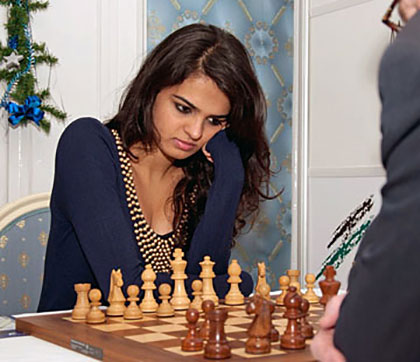
IM Tania Sachdev (Elo 2413)
IM Tania Sachdev was the first player to fall victim to this confusion, when in the very first round of the tournament she was flagged at move 41 as her time ran out! Probably more used to the time-controls seen in many European tournaments, IM Tania seemed unaware of the time-controls of the tournament. We asked her what exactly had transpired and she replied:
This is what happened with me:
Before the start of round one the arbiter was making the usual announcements. This is what he said about the time control "Time control is 90 min+30 seconds from move one and 30 min grace time." This was said all in one sentence. He never used the phrase 'for the entire game' or 'zero tolerance'. After this he moved on to round timings, etc. 'Grace time' does refer to zero tolerance. I found out later that exactly this had confused many players, and they double checked with the arbiter. Before this announcement I wasn't aware of the time control as mentioned in the prospectus. The way in which it was communicated I took it as 90 min + 30 min. Unfortunately, in my head I was convinced. The games started and I did not bother confirming.
I was Black, We completed move 40, my opponent made move 41 and still had about a minute on her clock. I had close to two minutes and thinking that time will be added once my clock runs out I just let it run out.The clock flagged and even at this point I thought something was wrong with the clock or it hadn't been set right! Then the Arbiter told me I had lost on time. I was totally confused, I said the announcement said 30 min. That is when I was told that he was talking about the zero tolerance rule. I do wish the Arbiter had communicated better. But of course its also my responsibility to know these things. Learnt it the hard way!
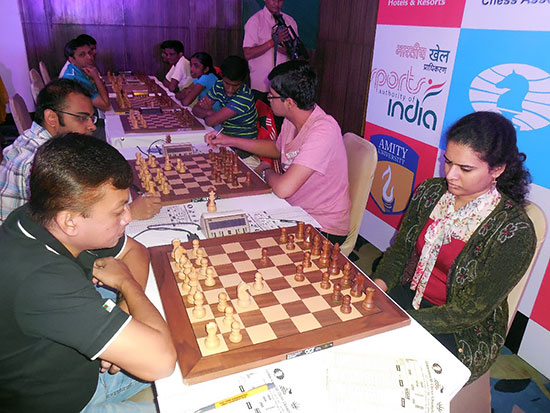
GM Koneru Humpy (Elo 2589)
The trend did not stop there. GM Koneru Humpy, one of the strongest woman players in the world, forfeited her fourth round game on time against IM Himanshu Sharma (2420), in a winning position. She ran out of time when she assumed that 30 minutes would be added to her clock after move 40. But before you read on you should ask yourself: what does the term "grace time" mean? [Addendum: we are informed that "grace time" in this context is commonly used in India].
We received a number of messages like the following from a top player in the Commonwealth Championship:
It is sad to see people bashing Humpy, without actually knowing whole picture. It would be great if an article can get published with her own comments and exactly what happened, so that people will get to know the actual facts and issues. It is a very sensitive matter because it's India organizing the event, so I guess its difficult for any Indian players to comment. Only Humpy can say what happened there...
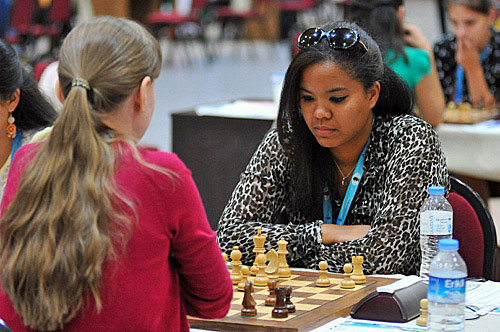
Well, there was someone in Delhi who could provide the other side of the story. Sabrina Chevannes (photo by Daaim Shabazz of Chess Drum), author of two popular ChessBase primers on DVD, is playing in the Championship in New Delhi. She is also a member of the Appeals Committee and as such a witness to the events that led to the forfeits of Sachdev and Humpy. Sabrina conducted the following in-depth interview with the third strongest female player in the world, and inserted her own observations (in grey boxes) to get to the bottom of this affair.
Chess in India: an interview with GM Koneru Humpy
By WIM Sabrina Chevannes
There has been much controversy in Delhi week at the Commonwealth Chess Championships 2015. Whilst Abhijeet Gupta is sailing through the tournament on 7/7, his main rival, GM Koneru Humpy is now nowhere to be seen. Many will have read the report about the events leading to her departure from the tournament, but I thought I would provide the most accurate description on what actually happened, since I was there every step of the way, from the moment Humpy found out about the time controls, as well as during the appeals meeting. I caught up with Humpy after everything was over to hear her thoughts on what happened and how things were portrayed in the media.
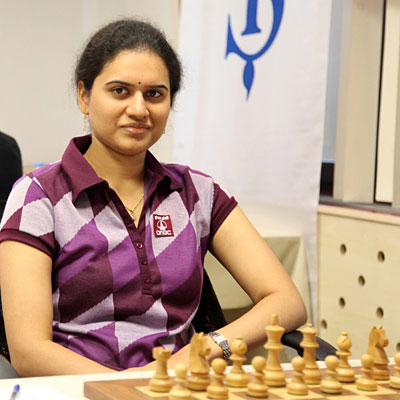
Sabrina Chevannes: You have been less active within the chess world recently compared to a few years ago; what is the reason behind this?
Koneru Humpy: Well, in the past few years I have been concentrating on the women-only tournaments and I also had to make sure that I had reasonable time in between the events to prepare. I also got married last year and therefore cut down on the amount I played recently because of this.
It has been a while since you have played in India, what is the reason behind this?
In Indian events like this one, even though it is an International Open, we find very few players from abroad. It is obvious that the strength of the event is weak, rating-wise. More importantly, the conditions and the organisation will not be up to the mark compared to European events.
Why do you think other top Indian GMs like Ganguly or Harikrishna don’t play in India anymore?
Hari is rated around 2740, so it won’t be of any help to him to play against weak opposition. The federation does not have any interest in promoting or supporting top players of the country by hosting category events or invitational tournaments. We have players around 2600, but because of the unprofessional organization, many of them are not interested.
What made you decide to play in the Commonwealth Championships this year?
This year, there were no FIDE women Grand Prix events scheduled, so I decided to play in some Opens, as it’s been quite a long time.
What were your expectations for this event?
I wanted to be amongst the top three and to enjoy my games.
You made it to 3.0/3 – were you feeling like you were in form and ready for a good tournament?
Yes, I felt I was in good form and was confident of finishing on top.
The round four fiasco: you played a lovely game, went to the bathroom on move 44, only to come back to find your clock at 0:00. Tell us how you felt when you saw this.
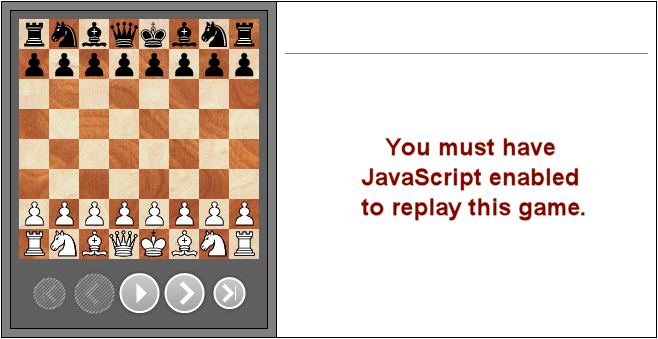
[Event "Commonwealth Championship Delhi"] [Site "?"] [Date "2015.06.25"] [Round "?"] [White "Humpy, Koneru"] [Black "Sharma, Himanshu"] [Result "0-1"] [ECO "D10"] [WhiteElo "2589"] [BlackElo "2420"] [PlyCount "87"] [SourceDate "2015.06.28"] 1. d4 d5 2. c4 c6 3. Nc3 Nf6 4. e3 a6 5. Qc2 g6 6. Bd3 Bg7 7. Nf3 O-O 8. O-O Bg4 9. Ne5 Be6 10. Bd2 Nbd7 11. Nxd7 Qxd7 12. cxd5 cxd5 13. Na4 Rac8 14. Qb3 Ne4 15. Ba5 Qd6 16. Nb6 Rb8 17. Rac1 f5 18. f3 Bh6 19. Rfe1 Nf6 20. Qb4 Rf7 21. Qc5 Bf8 22. Re2 Nd7 23. Nxd7 Bxd7 24. Qa7 Rc8 25. Rxc8 Bxc8 26. Rc2 Qe6 27. Kf2 Bh6 28. Bd2 Rf8 29. Rc7 Qd6 30. Qc5 Qxc5 31. Rxc5 Kf7 32. Bb4 Rd8 33. Ba5 Re8 34. Bc2 f4 35. e4 dxe4 36. fxe4 Bg7 37. e5 g5 38. Bxh7 Bd7 39. Rc7 Bc6 40. Bc2 Bd5 41. Bb4 Bf8 42. Bb3 Bxb3 43. axb3 Rd8 44. Bc5 {[#] In this totally winning position Humpy left the playing hall and went to the bathroom, expecting her clock to run down to zero and then add thirty minutes. When she got back she saw it had stopped at 0:00.} 0-1
I was shocked to see the clock at 0:00. I asked my opponent about the additional 30 minutes and he was confused and said to find out with the arbiter. I went to the arbiter and they said that there was no additional time control. I questioned that the announcement was made that we would have 90 min + 30 sec from move 1 and 30 minutes. To my surprise, the arbiter said 30 minutes is grace time. I accepted the result and immediately signed the score sheet.
|
This announcement confused many people, including myself. I read in the invitation that the time control was without additional time, but suddenly the arbiter is mentioning an extra 30 minutes. However, he actually said “grace time” and by this, he meant that each player has 30 minutes to get to his/her board before being defaulted. This never affected Humpy until round four, as she won her first three rounds before move 40.
Many say that Humpy should have realised there was no additional time once she didn’t see the extra 30 minutes added on to the clock after move 40. However, I have played many a tournament where the time is only added on to both sides after the first time allotment reaches 0:00. – Sabrina Chevannes |
Were you shocked to then learn that the same thing happened to Tania Sachdev in the first round?
Yes, I was. When such things occur, it is the moral responsibility of the arbiter and the organizing committee to inform players, so that further incidents do not occur. Instead, they hid the whole matter. I did not know that Tania had also lost this way. It was not announced to the players in any of the rounds to give clarity about the time control. Only after my loss, many players became aware of the time control that was in force. If they had published the issue on their website or made an announcement with the correction, this incident wouldn't have occurred.
When you realised that this did not only happen to you, how did you feel?
I was upset with the behaviour of the arbiter and the organisers and the way they spoke. When I got to know about Tania’s forfeit, other GMs also confirmed that they are still playing the tournament under the same impression of getting additional time. I was furious after knowing this. It's not only me; many are playing under the impression that they get an additional 30 minutes after move 40. That clearly indicates that it is the fault of the Chief Arbiter and of the organisers.
You were obviously upset with how things happened, but you were willing to accept it and move on. However, the arbiter coming into the lobby and basically stating he did nothing wrong and essentially calling you stupid for not knowing the rules must be upsetting – how did that make you feel then?
|
It actually made sense to listen to the arbiter for the announcements as so much had changed from the original invitation that was sent out for the event.
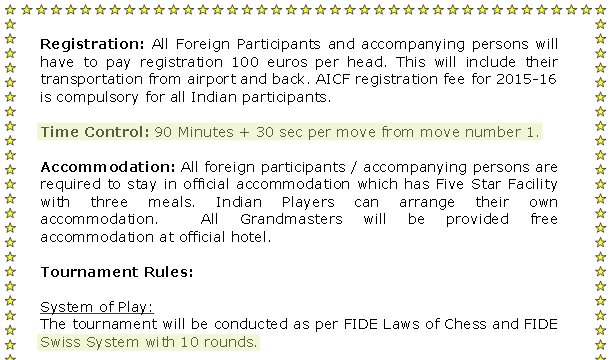
The Commonwealth Chess Championship 2015 regulations clearly state the time controls. But note that the rules also say the tournament is a ten-round Swiss. That this was changed to nine rounds and was announced by the arbiter at the start of the event, together with a complete change to the round times. So it wouldn’t have been surprising that the time control had changed too. When he said "Time control is 90 min + 30 seconds from move one and 30 min grace time," many players understood that to mean an extra 30 minutes after the time control, as is common in most international tournaments. – Sabrina Chevannes |
I had no problem accepting my defeat, but the rules were not announced properly and I felt bad that at the end of the day I lost a won game because of the arbiter’s unclear announcement. I feel it is their fault to have an inefficient and irresponsible person as an arbiter. The organization is guilty for this incident.
You decided to write a letter to the appeals committee, what did you want to achieve from your letter?
I wanted them to understand their mistake and to make sure that it doesn’t happen to any other players in future.
What were your realistic expectations about what would happen in the committee meeting?
I expected an apology for this unfortunate incident and I want them to make sure that in future they should organize their events with a capable arbiter who can communicate properly with the players.
| As a member of this appeals committee, it was a difficult situation to discuss. I could understand Humpy’s predicament and that the announcement was clearly misleading. I myself went to look for the rules and regulations, which I expected to be put up somewhere inside the hotel. However, there was nothing to be found anywhere. I happened to bump into one of the organisers after some time, who was roaming in the hotel lobby, who clarified the time control for me. Despite this, the appeals process is for a clear breach of rules and according to FIDE laws, the organisation/the arbiter did nothing wrong. It states in the FIDE laws that the player must be properly informed about the rules of the tournament. It is actually irrelevant what the arbiter announces. This is quite bizarre as most players do indeed listen to what the arbiter has to say. After all, they are officials and we, as players, trust that they know what they are talking about! – Sabrina Chevannes |
You were called into the meeting and it didn’t really go well – how did you feel about the way you were spoken to/treated during this meeting?
It was quite a weird meeting; having five members of the appeals committee, two of whom didn’t utter a word about their opinion. Their decision was "whatever the arbiter says doesn’t have value". I feel that if this is so, there is no need to make announcements and I would have stuck to what was written in the regulations.
Many people were questioning why you wrote “I would like to withdraw from the tournament” in the appeals letter – why did you decide to write that?

I felt there was no point to play in such circumstances, where there are no morals and ethics. I quit the tournament in protest of the unclear announcement (poor communication skills of the arbiter), irresponsible organization, several times power cuts occurring during the game, no live transmission until round four, etc. The tournament was run well below the international standards. No one took responsibilities to make the correct announcement due to which I lost and became mentally disturbed.
| The organisers implied that Humpy was simply throwing her toys out the pram and unnecessarily causing a fuss when she made a mistake. In reality, it was not like this at all. In fact, the organisers were clearly taking pleasure in her demise. They were taking photos and videos of the appeals meeting and laughing about the whole thing. When she wanted to go because she was getting teary, they would not let her and told her to sit down. They also told her she was just too emotional and needed to get over it. Frankly, it was the most humiliating treatment I have ever seen of such a top rated player ever. Considering Magnus was completely at fault and the organisation still massively apologised to him, this was a major extreme. – Sabrina Chevannes |
You said that you regret playing in India again after all this time – do you still feel this way? Is there a chance that you will ever come back?
I regret playing in an unprofessionally organized event and for the ill treatment given. As of now, I don’t have any intention to play in India anymore. If ever the situation changes and improves, I will think about it.
What do you think needs to be done to improve the quality of the tournaments in India?
If you had asked me this question before the event, I would have definitely answered it. Now, I believe that those who cannot accept their mistakes can never improve.
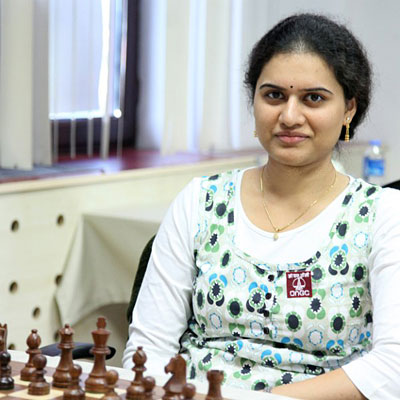
How does it make you feel the way they tried to portray you in the Indian media?
It is clear that they want a clean sheet for their tournament and the whole blame was put on me. They stated I had pleaded for mercy to reverse the game point and threatened to quit if this were not done. Everywhere it was published as I lost on time because of not knowing the rules.
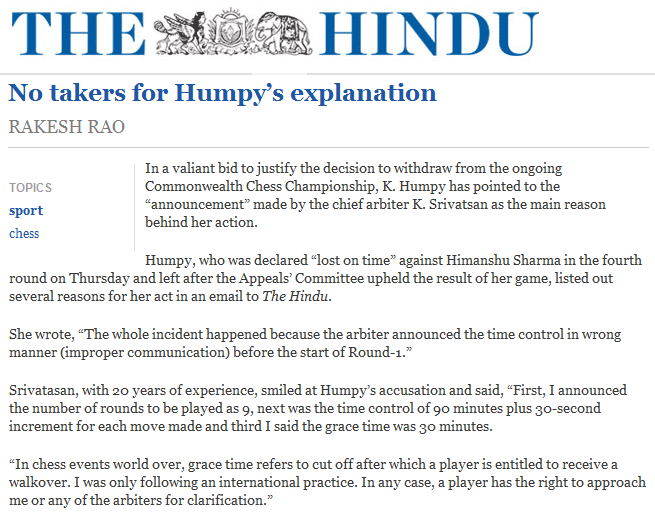
Sample article, here from June 27th in the national newspaper The Hindu
I am upset. The protest was only against the arbiter - I didn’t plead for my game point. The protest was not for the game point, only to make them understand that when they are hosting events like the Commonwealth Championship, they should maintain standards. The arbiter behaved irresponsible and did not have the capability of announcing the rules properly in English.
What would you like other players to learn from your situation?
I feel pity for Indian chess that the standards of the organisation, the conditions players get in Nationals and the official champs are below the standard that they should be. Unless they have the courage to raise their voice, nothing can be changed.
|
It was very sad to have witnessed this whole event occur in Delhi. I was very excited to be playing in the same competition as a world class player like Humpy and could not believe that this was happening to her. I think we have all learnt a lesson that we need to be clued up on the rules of the event, no matter what. It is not the arbiter’s responsibility to inform us, but we should make sure we do this ourselves. It is also very sad to hear about Humpy’s experience with Indian chess tournaments in general. India has produced an abundance of amazing players and I am always in awe when I watch them in action. However, for those players who are used to playing in Europe, I guess their expectations are high.
It is a shame that these events were portrayed somewhat differently in the media than to what actually happened, but I am glad that Humpy’s voice will now be heard. I certainly have learned a lot from these events that have occurred and I can only hope that Humpy’s withdrawal from the tournament will alert others to the problems that can occur in such circumstances. – Sabrina Chevannes |

GM Emil Sutovsky, President of the Association of Chess Professionals
Another very unpleasant story due to the unprofessional conduct of the event and low level of the arbiters in the tournament. It repeats itself again and again, and still we don't hear any report about some arbiter who was suspended or disqualified from his position. Takis Nikolopoulos, I think we'd all appreciate your opinion on the matter – both as an experienced arbiter and as a head of the FIDE Arbiter's Commission. What can be done to improve the level of arbiters (seminars don't really work, as we often see a serious mistakes by those who conduct these seminars...), don't you think that arbiter's serious mistakes should have some serious consequences not only for the players, but for the arbiters themselves? I can bring you several examples, when the arbiter was making a serious mistake and still was appointed to serve an important tournaments afterwards. Now, with the new anti-cheating guidelines the issue becomes more sensitive than ever, and it just can not continue this way.
We witness a lot of mistakes coming from the arbiters. Why so? Some of them may not be ready to the stress situation, some of them don't have enough experience, others are unfortunately getting too old, and many of them don't have sufficient chess background to feel the spirit of the law, and not only it's letter. As a result we have a lot of unfortunate decisions taken even in the most important events (let alone club competitions and children tournaments). Yes, arbiters are human, and everyone can err. But shall we expect an arbiter to be at least suspended for some period after a mistakes that cost some players so heavily? – On Facebook

































